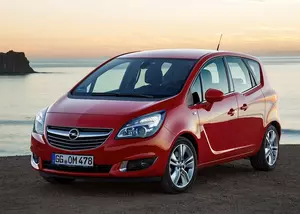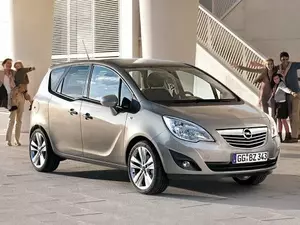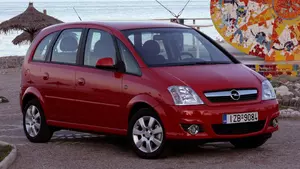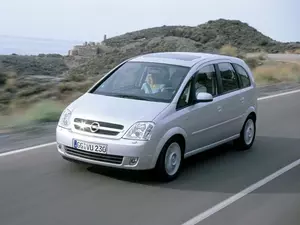


| Vehicle | Curb weight | Difference from world's smallest | Weight to power ratio | 0—60 mph acceleration ratio | Consumption ratio |
|---|---|---|---|---|---|
| 1.3 CDTI |
1393 kg / 3072 lbs |
968 kg (2135 lbs) heavier | 15 kg to 1 hp | 87 kg/s (192 lbs/s) |
310 kg/L (684 lbs/L) |
| Vehicle | 1.3 CDTI |
|---|---|
| Curb weight |
1393 kg / 3072 lbs |
| Difference from world's smallest | 968 kg (968 lbs) heavier |
| Weight to power ratio | 15 kg to 1 hp |
| 0—60 mph acceleration ratio | 87 kg/s (192 lbs/s) |
| Consumption ratio |
310 kg/L (684 lbs/L) |

| Vehicle | Curb weight | Difference from world's smallest | Weight to power ratio | 0—60 mph acceleration ratio | Consumption ratio |
|---|---|---|---|---|---|
| 1.4 Turbo |
1286 kg / 2836 lbs |
861 kg (1899 lbs) heavier | 9 kg to 1 hp | 131 kg/s (289 lbs/s) |
192 kg/L (423 lbs/L) |
| 1.4 LPG Turbo |
1286 kg / 2836 lbs |
861 kg (1899 lbs) heavier | 11 kg to 1 hp | 118 kg/s (260 lbs/s) |
218 kg/L (481 lbs/L) |
| 1.7 DTC |
1428 kg / 3149 lbs |
1003 kg (2212 lbs) heavier | 13 kg to 1 hp | 128 kg/s (282 lbs/s) |
275 kg/L (606 lbs/L) |
| 1.7 DTS |
1428 kg / 3149 lbs |
1003 kg (2212 lbs) heavier | 11 kg to 1 hp | 152 kg/s (335 lbs/s) |
275 kg/L (606 lbs/L) |
| 1.4 XER |
1286 kg / 2836 lbs |
861 kg (1899 lbs) heavier | 13 kg to 1 hp | 97 kg/s (214 lbs/s) |
211 kg/L (465 lbs/L) |
| 1.3 CDTI |
1428 kg / 3149 lbs |
1003 kg (2212 lbs) heavier | 15 kg to 1 hp | 109 kg/s (240 lbs/s) |
317 kg/L (699 lbs/L) |
| 1.3 DTE |
1428 kg / 3149 lbs |
1003 kg (2212 lbs) heavier | 15 kg to 1 hp | 109 kg/s (240 lbs/s) |
348 kg/L (767 lbs/L) |
| 1.7 DT |
1428 kg / 3149 lbs |
1003 kg (2212 lbs) heavier | 14 kg to 1 hp | 108 kg/s (238 lbs/s) |
223 kg/L (492 lbs/L) |
| Vehicle | 1.4 Turbo |
|---|---|
| Curb weight |
1286 kg / 2836 lbs |
| Difference from world's smallest | 861 kg (861 lbs) heavier |
| Weight to power ratio | 9 kg to 1 hp |
| 0—60 mph acceleration ratio | 131 kg/s (289 lbs/s) |
| Consumption ratio |
192 kg/L (423 lbs/L) |
| Vehicle | 1.4 LPG Turbo |
| Curb weight |
1286 kg / 2836 lbs |
| Difference from world's smallest | 861 kg (861 lbs) heavier |
| Weight to power ratio | 11 kg to 1 hp |
| 0—60 mph acceleration ratio | 118 kg/s (260 lbs/s) |
| Consumption ratio |
218 kg/L (481 lbs/L) |
| Vehicle | 1.7 DTC |
| Curb weight |
1428 kg / 3149 lbs |
| Difference from world's smallest | 1003 kg (1003 lbs) heavier |
| Weight to power ratio | 13 kg to 1 hp |
| 0—60 mph acceleration ratio | 128 kg/s (282 lbs/s) |
| Consumption ratio |
275 kg/L (606 lbs/L) |
| Vehicle | 1.7 DTS |
| Curb weight |
1428 kg / 3149 lbs |
| Difference from world's smallest | 1003 kg (1003 lbs) heavier |
| Weight to power ratio | 11 kg to 1 hp |
| 0—60 mph acceleration ratio | 152 kg/s (335 lbs/s) |
| Consumption ratio |
275 kg/L (606 lbs/L) |
| Vehicle | 1.4 XER |
| Curb weight |
1286 kg / 2836 lbs |
| Difference from world's smallest | 861 kg (861 lbs) heavier |
| Weight to power ratio | 13 kg to 1 hp |
| 0—60 mph acceleration ratio | 97 kg/s (214 lbs/s) |
| Consumption ratio |
211 kg/L (465 lbs/L) |
| Vehicle | 1.3 CDTI |
| Curb weight |
1428 kg / 3149 lbs |
| Difference from world's smallest | 1003 kg (1003 lbs) heavier |
| Weight to power ratio | 15 kg to 1 hp |
| 0—60 mph acceleration ratio | 109 kg/s (240 lbs/s) |
| Consumption ratio |
317 kg/L (699 lbs/L) |
| Vehicle | 1.3 DTE |
| Curb weight |
1428 kg / 3149 lbs |
| Difference from world's smallest | 1003 kg (1003 lbs) heavier |
| Weight to power ratio | 15 kg to 1 hp |
| 0—60 mph acceleration ratio | 109 kg/s (240 lbs/s) |
| Consumption ratio |
348 kg/L (767 lbs/L) |
| Vehicle | 1.7 DT |
| Curb weight |
1428 kg / 3149 lbs |
| Difference from world's smallest | 1003 kg (1003 lbs) heavier |
| Weight to power ratio | 14 kg to 1 hp |
| 0—60 mph acceleration ratio | 108 kg/s (238 lbs/s) |
| Consumption ratio |
223 kg/L (492 lbs/L) |

| Vehicle | Curb weight | Difference from world's smallest | Weight to power ratio | 0—60 mph acceleration ratio | Consumption ratio |
|---|---|---|---|---|---|
| 1.7 CDTI |
1455 kg / 3208 lbs |
1030 kg (2271 lbs) heavier | 12 kg to 1 hp | 140 kg/s (309 lbs/s) |
269 kg/L (593 lbs/L) |
| 1.8i 16V |
1380 kg / 3043 lbs |
955 kg (2106 lbs) heavier | 11 kg to 1 hp | 118 kg/s (260 lbs/s) |
168 kg/L (370 lbs/L) |
| 1.3 CDTI |
1320 kg / 2911 lbs |
895 kg (1974 lbs) heavier | 18 kg to 1 hp | 78 kg/s (172 lbs/s) |
264 kg/L (582 lbs/L) |
| 1.4i 16V |
1260 kg / 2778 lbs |
835 kg (1841 lbs) heavier | 14 kg to 1 hp | 96 kg/s (212 lbs/s) |
197 kg/L (434 lbs/L) |
| 1.6i |
1375 kg / 3032 lbs |
950 kg (2095 lbs) heavier | 13 kg to 1 hp | 109 kg/s (240 lbs/s) |
183 kg/L (404 lbs/L) |
| 1.4 LPG |
1260 kg / 2778 lbs |
835 kg (1841 lbs) heavier | 14 kg to 1 hp | 96 kg/s (212 lbs/s) |
203 kg/L (448 lbs/L) |
| OPC 1.6i 16V |
1450 kg / 3197 lbs |
1025 kg (2260 lbs) heavier | 8 kg to 1 hp | 186 kg/s (410 lbs/s) | - |
| Vehicle | 1.7 CDTI |
|---|---|
| Curb weight |
1455 kg / 3208 lbs |
| Difference from world's smallest | 1030 kg (1030 lbs) heavier |
| Weight to power ratio | 12 kg to 1 hp |
| 0—60 mph acceleration ratio | 140 kg/s (309 lbs/s) |
| Consumption ratio |
269 kg/L (593 lbs/L) |
| Vehicle | 1.8i 16V |
| Curb weight |
1380 kg / 3043 lbs |
| Difference from world's smallest | 955 kg (955 lbs) heavier |
| Weight to power ratio | 11 kg to 1 hp |
| 0—60 mph acceleration ratio | 118 kg/s (260 lbs/s) |
| Consumption ratio |
168 kg/L (370 lbs/L) |
| Vehicle | 1.3 CDTI |
| Curb weight |
1320 kg / 2911 lbs |
| Difference from world's smallest | 895 kg (895 lbs) heavier |
| Weight to power ratio | 18 kg to 1 hp |
| 0—60 mph acceleration ratio | 78 kg/s (172 lbs/s) |
| Consumption ratio |
264 kg/L (582 lbs/L) |
| Vehicle | 1.4i 16V |
| Curb weight |
1260 kg / 2778 lbs |
| Difference from world's smallest | 835 kg (835 lbs) heavier |
| Weight to power ratio | 14 kg to 1 hp |
| 0—60 mph acceleration ratio | 96 kg/s (212 lbs/s) |
| Consumption ratio |
197 kg/L (434 lbs/L) |
| Vehicle | 1.6i |
| Curb weight |
1375 kg / 3032 lbs |
| Difference from world's smallest | 950 kg (950 lbs) heavier |
| Weight to power ratio | 13 kg to 1 hp |
| 0—60 mph acceleration ratio | 109 kg/s (240 lbs/s) |
| Consumption ratio |
183 kg/L (404 lbs/L) |
| Vehicle | 1.4 LPG |
| Curb weight |
1260 kg / 2778 lbs |
| Difference from world's smallest | 835 kg (835 lbs) heavier |
| Weight to power ratio | 14 kg to 1 hp |
| 0—60 mph acceleration ratio | 96 kg/s (212 lbs/s) |
| Consumption ratio |
203 kg/L (448 lbs/L) |
| Vehicle | OPC 1.6i 16V |
| Curb weight |
1450 kg / 3197 lbs |
| Difference from world's smallest | 1025 kg (1025 lbs) heavier |
| Weight to power ratio | 8 kg to 1 hp |
| 0—60 mph acceleration ratio | 186 kg/s (410 lbs/s) |
| Consumption ratio | - |

| Vehicle | Curb weight | Difference from world's smallest | Weight to power ratio | 0—60 mph acceleration ratio | Consumption ratio |
|---|---|---|---|---|---|
| 1.8i 16V |
1380 kg / 3043 lbs |
955 kg (2106 lbs) heavier | 11 kg to 1 hp | 129 kg/s (284 lbs/s) |
168 kg/L (370 lbs/L) |
| 1.4i 16V |
1260 kg / 2778 lbs |
835 kg (1841 lbs) heavier | 14 kg to 1 hp | 96 kg/s (212 lbs/s) |
197 kg/L (434 lbs/L) |
| 1.3 CDTI |
1320 kg / 2911 lbs |
895 kg (1974 lbs) heavier | 19 kg to 1 hp | 78 kg/s (172 lbs/s) |
264 kg/L (582 lbs/L) |
| 1.6i |
1350 kg / 2977 lbs |
925 kg (2040 lbs) heavier | 16 kg to 1 hp | 98 kg/s (216 lbs/s) |
173 kg/L (381 lbs/L) |
| 1.6i 16V |
1375 kg / 3032 lbs |
950 kg (2095 lbs) heavier | 14 kg to 1 hp | 101 kg/s (223 lbs/s) |
205 kg/L (452 lbs/L) |
| 1.7 CDTI |
1455 kg / 3208 lbs |
1030 kg (2271 lbs) heavier | 15 kg to 1 hp | 115 kg/s (254 lbs/s) |
275 kg/L (606 lbs/L) |
| Vehicle | 1.8i 16V |
|---|---|
| Curb weight |
1380 kg / 3043 lbs |
| Difference from world's smallest | 955 kg (955 lbs) heavier |
| Weight to power ratio | 11 kg to 1 hp |
| 0—60 mph acceleration ratio | 129 kg/s (284 lbs/s) |
| Consumption ratio |
168 kg/L (370 lbs/L) |
| Vehicle | 1.4i 16V |
| Curb weight |
1260 kg / 2778 lbs |
| Difference from world's smallest | 835 kg (835 lbs) heavier |
| Weight to power ratio | 14 kg to 1 hp |
| 0—60 mph acceleration ratio | 96 kg/s (212 lbs/s) |
| Consumption ratio |
197 kg/L (434 lbs/L) |
| Vehicle | 1.3 CDTI |
| Curb weight |
1320 kg / 2911 lbs |
| Difference from world's smallest | 895 kg (895 lbs) heavier |
| Weight to power ratio | 19 kg to 1 hp |
| 0—60 mph acceleration ratio | 78 kg/s (172 lbs/s) |
| Consumption ratio |
264 kg/L (582 lbs/L) |
| Vehicle | 1.6i |
| Curb weight |
1350 kg / 2977 lbs |
| Difference from world's smallest | 925 kg (925 lbs) heavier |
| Weight to power ratio | 16 kg to 1 hp |
| 0—60 mph acceleration ratio | 98 kg/s (216 lbs/s) |
| Consumption ratio |
173 kg/L (381 lbs/L) |
| Vehicle | 1.6i 16V |
| Curb weight |
1375 kg / 3032 lbs |
| Difference from world's smallest | 950 kg (950 lbs) heavier |
| Weight to power ratio | 14 kg to 1 hp |
| 0—60 mph acceleration ratio | 101 kg/s (223 lbs/s) |
| Consumption ratio |
205 kg/L (452 lbs/L) |
| Vehicle | 1.7 CDTI |
| Curb weight |
1455 kg / 3208 lbs |
| Difference from world's smallest | 1030 kg (1030 lbs) heavier |
| Weight to power ratio | 15 kg to 1 hp |
| 0—60 mph acceleration ratio | 115 kg/s (254 lbs/s) |
| Consumption ratio |
275 kg/L (606 lbs/L) |